King Lear
A Most Unfamiliar Lear in Its Purity
American Shakespeare Center, Blackfriars Playhouse, Staunton, Virginia
Friday, August 19, 2016, C–2&3 (front left stalls)
Directed by Jenny Bennett
When you watch the American Shakespeare Center's current production of William Shakespeare's King Lear at the Blackfriars Playhouse, you are watching as pure a presentation of this great tragedy as you are ever likely to see. That makes it kind of strange for those of us coming to this production having seen other versions fashioned by 400 years of social, theatrical, and, most importantly, psychological evolution.
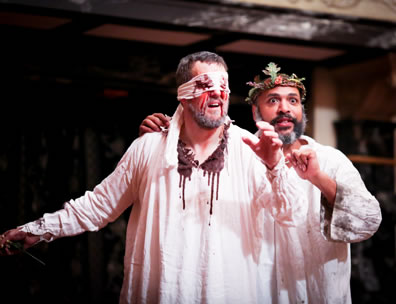
The blinded Gloucester (John Harrell) with the mad King Lear (René Thornton Jr.) in the American Shakespeare Center production of William Shakespeare's King Lear at the Blackfriars Playhouse. Photo by Lindsey Walters, American Shakespeare Center.
That's why I laud the approach Director Jenny Bennett has taken with the play, though I'm not entirely satisfied with the results. I'm fascinated by character interpretations here that I've never seen before (in more than a dozen productions), each making perfect Shakespearean sense; yet, some of these performances undermine the play's power. In the title role, René Thornton Jr. gives an insightfully intelligent reading of the king and what drives him to his royal screw-up in the first scene and the madness that comes later; however, such a complex portrayal requires meditating on the whole of it to fully appreciate, something you can't do in the middle of the action. And what action it is: I love how this presentation shows the seeds of intrafamily discord already taking root in the first scene, ignores the Fool's plight, and uses natural, nonelectric, noncomputerized devices to create the most hellish storm and battle I've ever experienced; nevertheless, the pacing is hurried (at least in the performance we saw), especially undermining Edgar's role. All that said, my tears flow at the end—twice; and that's what counts most. This production, and Thornton in particular, pass my strictest litmus test in all of Shakespeare.
Bennett helmed the American Shakespeare Center (ASC) production of The Winter's Tale last year, and she noticeably stamped that play with a woman's perspective while keeping true to Shakespeare's text. It was her first production experience with the Blackfriars, and for King Lear she concentrates more on the ASC's mission to stage plays as Shakespeare and his company, the King's Men, would have in their original Blackfriars theater.
The ASC's Blackfriars in Staunton, Virginia, is the world's only re-creation of Shakespeare's indoor theater, and the company, as much as possible, re-creates the staging conditions of Shakespeare's time. Productions use universal lighting: the candles in the iron chandeliers remain lit throughout the play, so both audience and actors are in the light (the candles are electric, thanks to fire codes Shakespeare didn't have to deal with). The audience sits in close proximity on three sides, and some even sit on the stage itself, on "gallant's stools" on either side. The cast plays music before the play and during the interlude. As in Shakespeare's day, the actors perform contemporary songs. ASC's choices are thematic to the particular play they are presenting: For King Lear, selections include Supertramp's "The Logical Song," Fleetwood Mac's "Landslide," Mumford & Sons' "Below My Feet," David Bowie's "Changes," and Miranda Lambert's "Gunpowder and Lead."
The music is all performed acoustically because, except for the universal lighting, the Blackfriars uses no electronics in its performances. We can all wonder what Shakespeare might have done with light grids, soundboards, and digital technology; but it's much more fascinating to see, hear, and feel how he could have pulled off his play's elaborate special effects without all of that. For King Lear, the cast backstage, under stage, above stage, and behind the house creates the raging storm on the heath through a combination of string instruments, drums, vocalizations, door slams, and other manual effects in true surround-sound (as if a poltergeist haunts the place). The battle in Act V utilizes the same tricks, but starts with a solo violin setting the ominous mood of coming conflict. This is the magic of handcrafted theater arts.
Bennett goes beyond applying renaissance stagecraft and a Jacobean aesthete to the play (Jenny McNee's costumes are so rich, you'd think that period paintings of Henry VIII, Elizabeth I, James I, Essex, and all their company had come to life). Bennett approaches the play not only from the perspective of an early 17th century audience, but from the probable perspective of the playwright himself. Our 21st century minds approach King Lear as Shakespeare's most nihilistic tragedy with its desolate landscape, depictions of insanity, extreme greed, political and family dysfunction, violent cruelty, total disintegration of social order, and shocking, lachrymal ending. Yet, this production plays as a comedy as much as it does a tragedy.
Shakespeare always mingled comedy in with his tragedies (and vice versa), and over the years, ASC has never shied away from exposing this duality when staging Elizabethan and Jacobean plays, even making it the thematic essence of some productions. It's just that you don't expect King Lear to be so funny. I never noticed so many laugh lines in it before this production; almost as many as Twelfth Night, also playing in this season's repertoire. Two characters in particular carry much of Lear's comedy: the Fool and Edmund, bastard son of Gloucester. In presenting these two roles, Bennett and the actors playing them, Chris Johnston and Patrick Earl, respectively, reference kindred characters elsewhere in Shakespeare's canon.
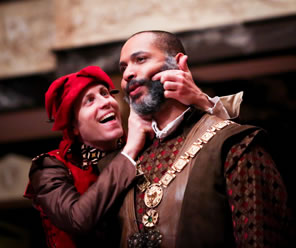
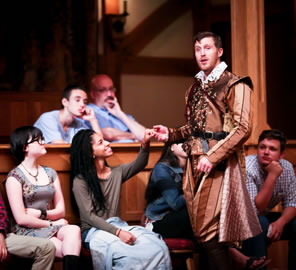
Top, the Fool (Chris Johnston) jests with Lear (René Thornton Jr.) in King Lear at the Blackfriars Playhouse. Above, Edmund (Patrick Earl) consorts with the audience. Photos by Lindsey Walters, American Shakespeare Center.
It's common in productions that I've seen of King Lear that the Fool, even when portrayed as a traditional court jester, be the sad clown, sharing in Lear's misery and struggling with his own depression ("Since my young lady's going into France, sir, the fool hath much pined away," a servant tells Lear). Johnston, however, is very much the jester in behavior—quick-witted but slightly dopey, rat-a-tat-tatting Borscht Belt jokes—as well as costume (red fool's cap, red vest, and black, white, and red-patterned breeches over red stockings and red fringed shoes). He fits in the tradition of Shakespeare's other great "licensed fools": Touchstone in As You Like It, Lavache in All's Well That Ends Well, and, most pointedly, Feste in Twelfth Night. Like Lear's Fool, Feste is dealing with his own emotional issues (he fled the house before the play) and engages in ironic humor and pointed jokes meant to penetrate to the core of those sickly minded people he serves. That Johnston is playing both parts this season may be purposeful, though he's using completely different styles in his portrayals: His Feste is more of a Woody Guthrie social critic in keeping with that production's early 20th century setting. Nevertheless, you could easily imagine him transplanting his Lear Fool to an Elizabethan staging of Twelfth Night.
Earl's Edmund descends directly from Iago in Othello. Well duh!, but I don't ever recall seeing Edmund played that way before. From his opening soliloquy—"Now, gods, stand up for bastards!"—through his many asides, Earl's Edmund, like Iago, uses the audience as his confidant. His tools for capturing our fascination are genial bonhomie, ridiculing his victims behind their backs, glint-eyed ambition, and a sporting attitude. Earl's Edmund also is funny. "I shall serve you, sir, truly," he says to Cornwall, then finishing in a scoffing aside to us, "however else."
Bringing out the play's humor is a worthy endeavor, but at times it seems out of balance, particularly when it's physical comedy. In the heath scene after Kent (David Anthony Lewis in a powerful performance) leads Lear and the Fool to the hovel, the Fool is the first to enter, down through the stage trap door. Johnston ends up dangling upside down, his red-stockinged legs kicking in the air. This leaves the audience in stitches and totally ignoring Lear's prayer for the "poor naked wretches, wheresoe'er you are, that bide the pelting of this pitiless storm." Lost in the laughter is one of Shakespeare's most soul-searing speeches and a turning point for the character of Lear and the play's thematic arc.
Thornton as an actor is at the top of his game (even though I sense his "game" has yet to peak), and he knows how to play mental turbulence well. He's on less-sure footing playing old. Lear the king gets much harsh criticism for being too ornery and too egotistical—and therefore too foolish—in the opening scene when his only real fault is that he's too old, even by his own admission. Thornton gives us a commanding Lear in the opening scene, yet one who consciously tries to control his own temper (and fails). His is a baffled Lear in subsequent scenes, falling back on his despotic temper as he tries to fathom his daughters' behavior and his loss of privilege while aware that madness is knocking at his mind. Ironically, when Lear succumbs to madness, Thornton leaves vulnerability behind and displays a commanding invincibility. "Is't not the king?" the blinded Gloucester asks upon hearing Lear's voice. "Ay, every inch a king," replies Lear, which Thornton says with adamant pride.
Thornton's key moment comes when Edmund orders the captured Lear and Cordelia (Lauren Ballard) to prison. "Upon such sacrifices, my Cordelia, the gods themselves throw incense," Lear says, and Ballard's Cordelia rushes to hug him. "Have I caught thee?" Lear says, Thornton expressing it with a gasp of surprise. This was his journey all along, to catch and hold Cordelia, a journey he started even before the love contest of the opening scene. Thornton's Lear is careworn and wants a peaceful retirement, and this plays into his short temper in the opening scene when he mistakes his youngest daughter's expression of her true heart for rebellion, launching the tragic progression that follows. "We have seen the best of our time," Gloucester (a sturdily sympathetic John Harrell) observes after Lear's banishments of both Cordelia and Kent. When Lear fumbled Cordelia away, his life became chaos; once he regains her, even though they are heading to prison, his life makes sense again. It is, at last, the best of his time: trigger the tear ducts, his and ours. But, howl!, too soon is all that destroyed with the last scene. "Stay a little," he begs the dead Cordelia, his heart breaking and ours breaking, too.
This devastating scene is the production's great moment of truth. However, Bennett and company offer up many other insightful passages and portrayals. Keenest of them all is Benjamin Reed as Cornwall. This guy is mean from the get-go. So much is going on in the opening scene, but Reed's Cornwall keeps grabbing my attention with his sense of self-importance and obvious ambition. When Lear orders his two sons-in-law, Cornwall and Albany (Alexander Sovronsky in a portrayal of deep earnestness), to "digest the third" dowry that was intended for Cordelia, Cornwall tussles with Albany before yanking the map away, the first sign of civil discord later reported brewing between the two dukes. Reed maintains Cornwall's easy malevolence throughout the rest of the play, and it is with eager glee along with raging temper that he gouges out Gloucester's eyes, as if he'd been wanting to do that to somebody for a long time.
How could such a guy have such a loving wife in Regan? Because Alison Glenzer plays Lear's middle daughter as Cornwall's soul mate in mind and ambition. When Lear argues that "I gave you all," she replies with the sickest of sweet smiles, "And in good time you gave it." But the smile that makes us squirm most comes during her interaction with her elder sister's servant, Oswald (Shunté Lofton in a delightful portrayal of dedication to good service). After Glenzer's Regan plants a kiss full on the mouth of Oswald, saying it is a message to Edmund, she tightens her clutch on the servant's shoulders and leans in to Oswald's ear, saying, "And when your mistress hears thus much from you, I pray desire her call her wisdom to her." She speaks this with such an evil smile that we know that more than eyeballs are at stake here, for both mistress and servant.
Jessika Williams plays that eldest sister, Goneril, with super seriousness, even as she courts Edmund behind her husband's back. There's a superiority in her complex personality: note how, after she showers her father with expressive love, she scowls in disdain when he presents her moiety of land, much smaller than "the third" for Cordelia. Her Goneril is emotionally shaken only when Lear levels his curse of sterility at her. Lear's vicious verbal attack stabs her deeply, not because she believes the curse will come to fruition, but because a father could say such a thing to his daughter.
Ballard's Cordelia is as truehearted as Cordelias come, but there's a nice staging decision in the first scene when, with Kent, Gloucester, and Edmund already on stage, as the royal family enters Cordelia dashes over to Kent to give him a hug. He is the true family friend, and his continuing service, in disguise, to Lear is as much out of genuine care for Cordelia as duty to his king.
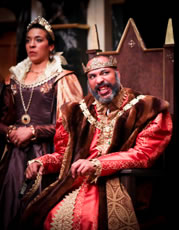
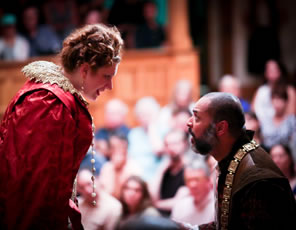
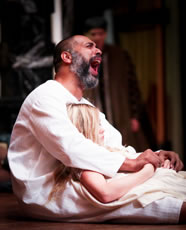 King Lear (René Thornton Jr.) with his daughters, from left, Goneril (Jessika Williams), Regan (Allison Glenzer), and Cordelia (Lauren Ballard). Photos by Lindsey Walters, American Shakespeare Center.
King Lear (René Thornton Jr.) with his daughters, from left, Goneril (Jessika Williams), Regan (Allison Glenzer), and Cordelia (Lauren Ballard). Photos by Lindsey Walters, American Shakespeare Center.For me, however, a major highlight of this production is what isn't added: a conclusion to the Fool's plight. Shakespeare merely drops him after the heath scenes. Scholars speculate the same actor played Cordelia—though Robert Armin, who likely played the Fool, was older than Shakespeare—and point to Lear's lamentation over his daughter at the end that his "poor fool is hang'd." Some directors even stage the Fool being hanged. This production ignores all that: Johnston merely goes to sleep at the back of the stage on his last line, "I'll go to bed at noon," then we never see or hear of him again (Thornton's Lear is clearly referring to his daughter, who was hanged, in his mourning). Shakespeare doesn't concern himself with what happened to the Fool, so why should Bennett? Amen!
All she's concerned with is Shakespeare's own frame of mind when he was penning King Lear. She finds that in the text itself, the one Shakespeare wrote, not the one we've refashioned over 400 years.
Eric Minton
September 12, 2016
Comment: e-mail editorial@shakespeareances.com
Start a discussion in the Bardroom



 Find additional Shakespeareances
Find additional Shakespeareances